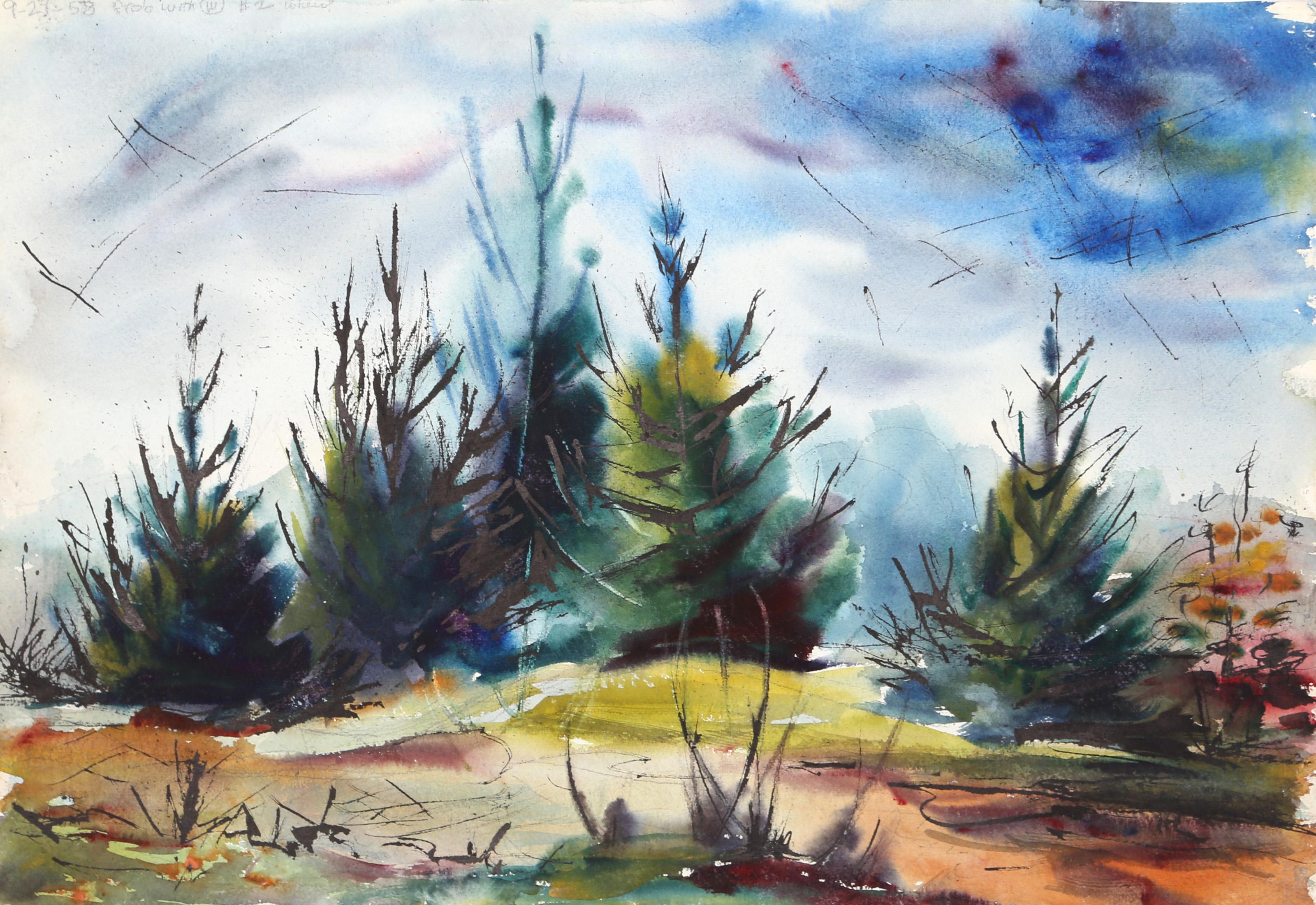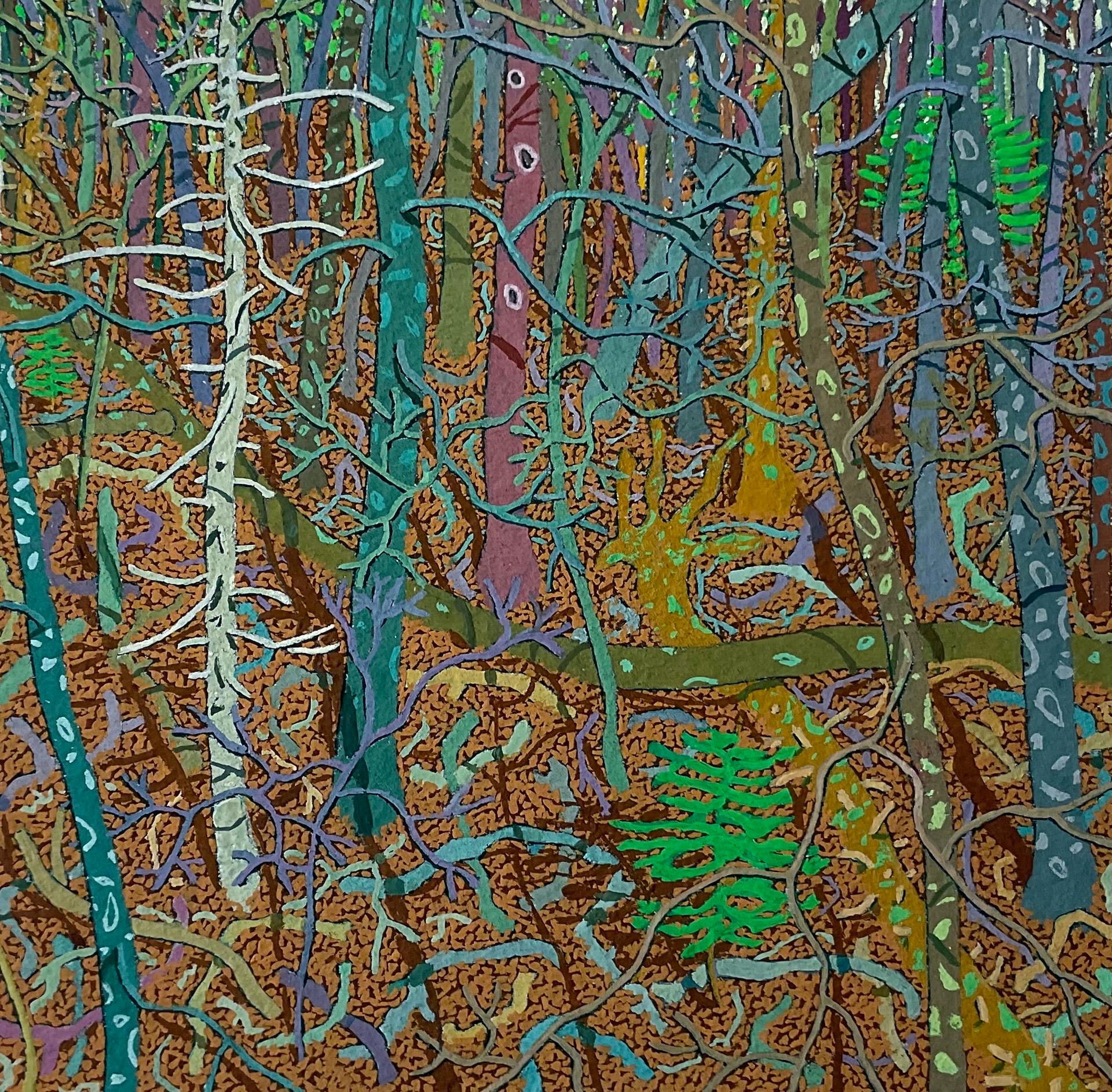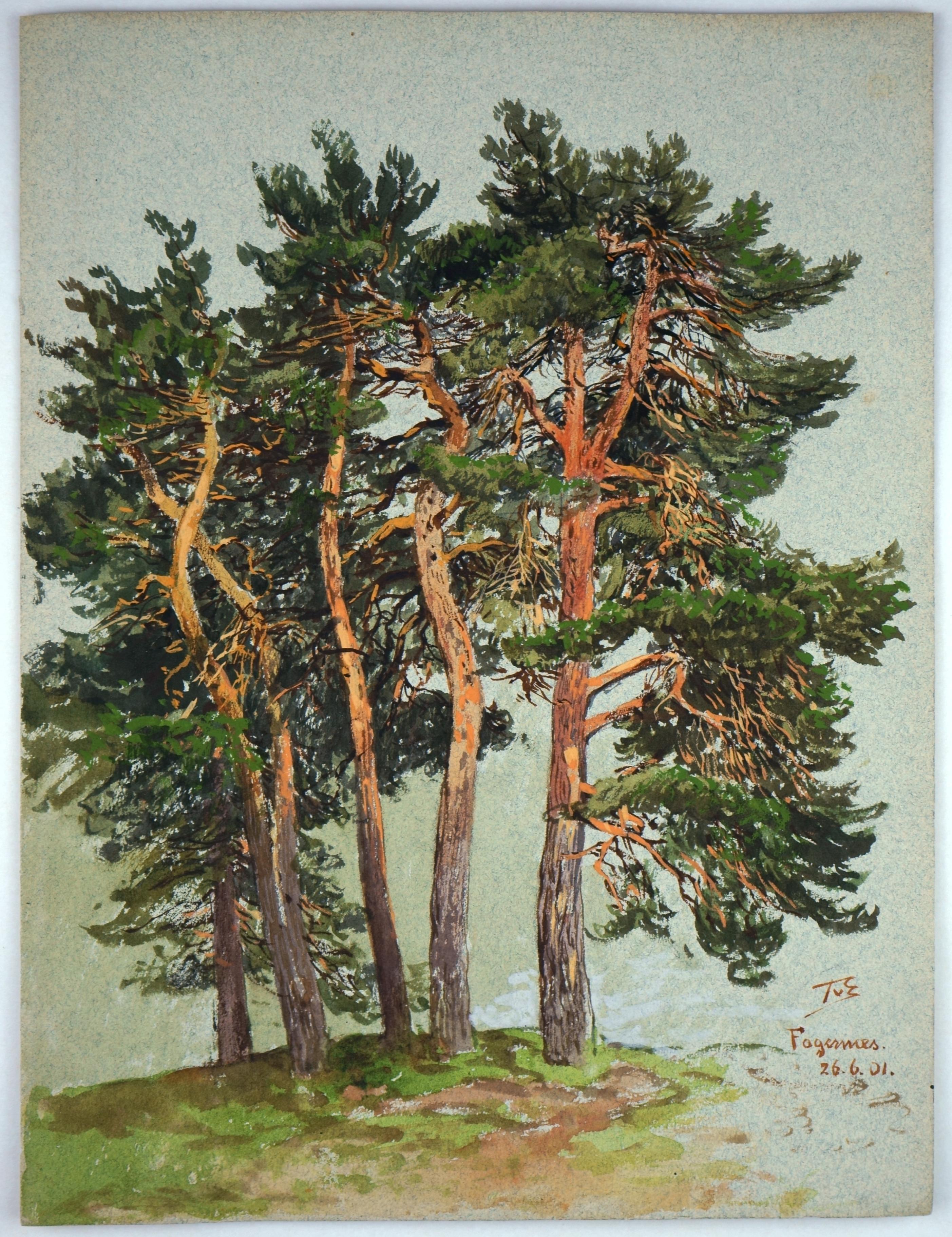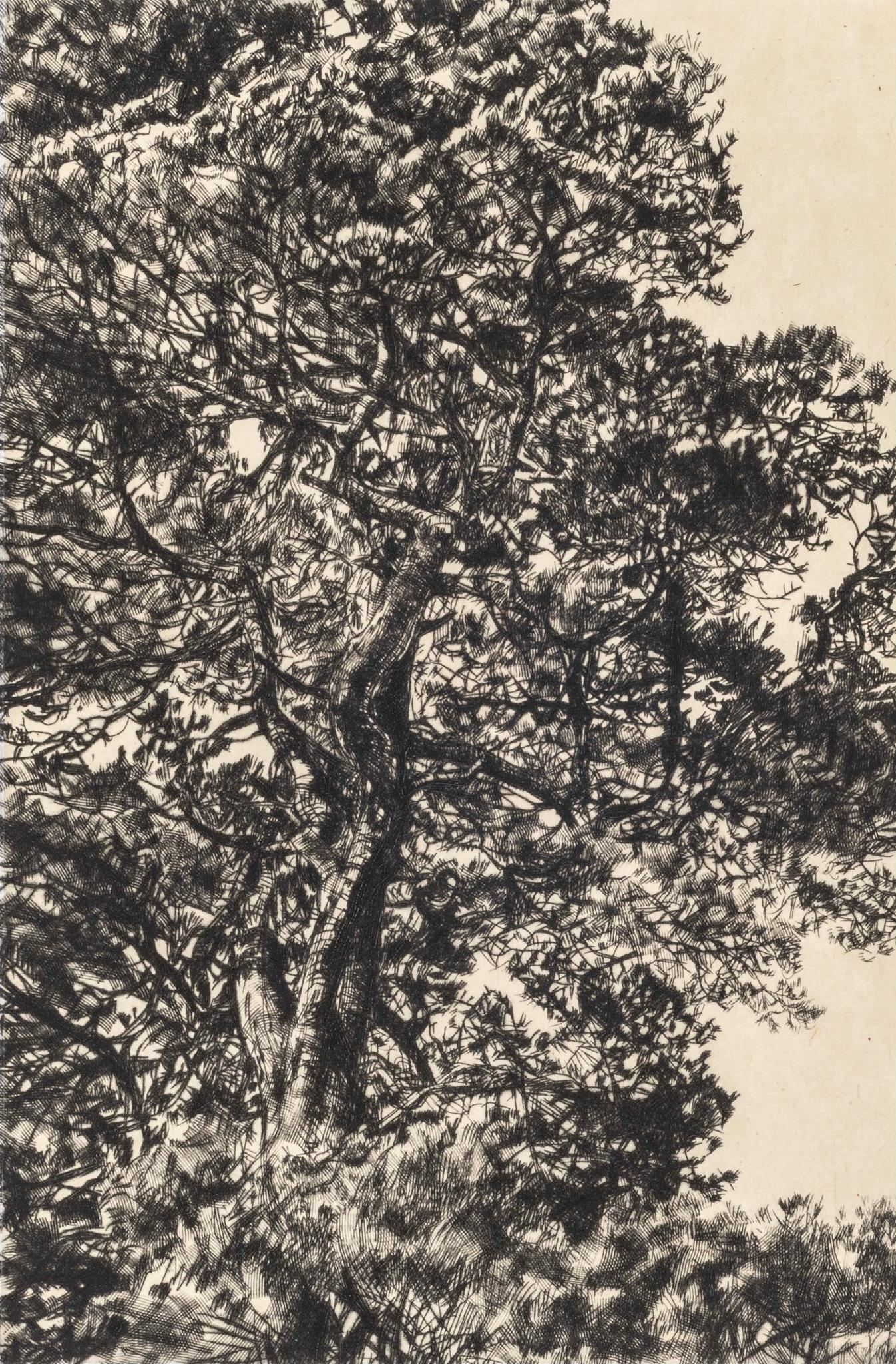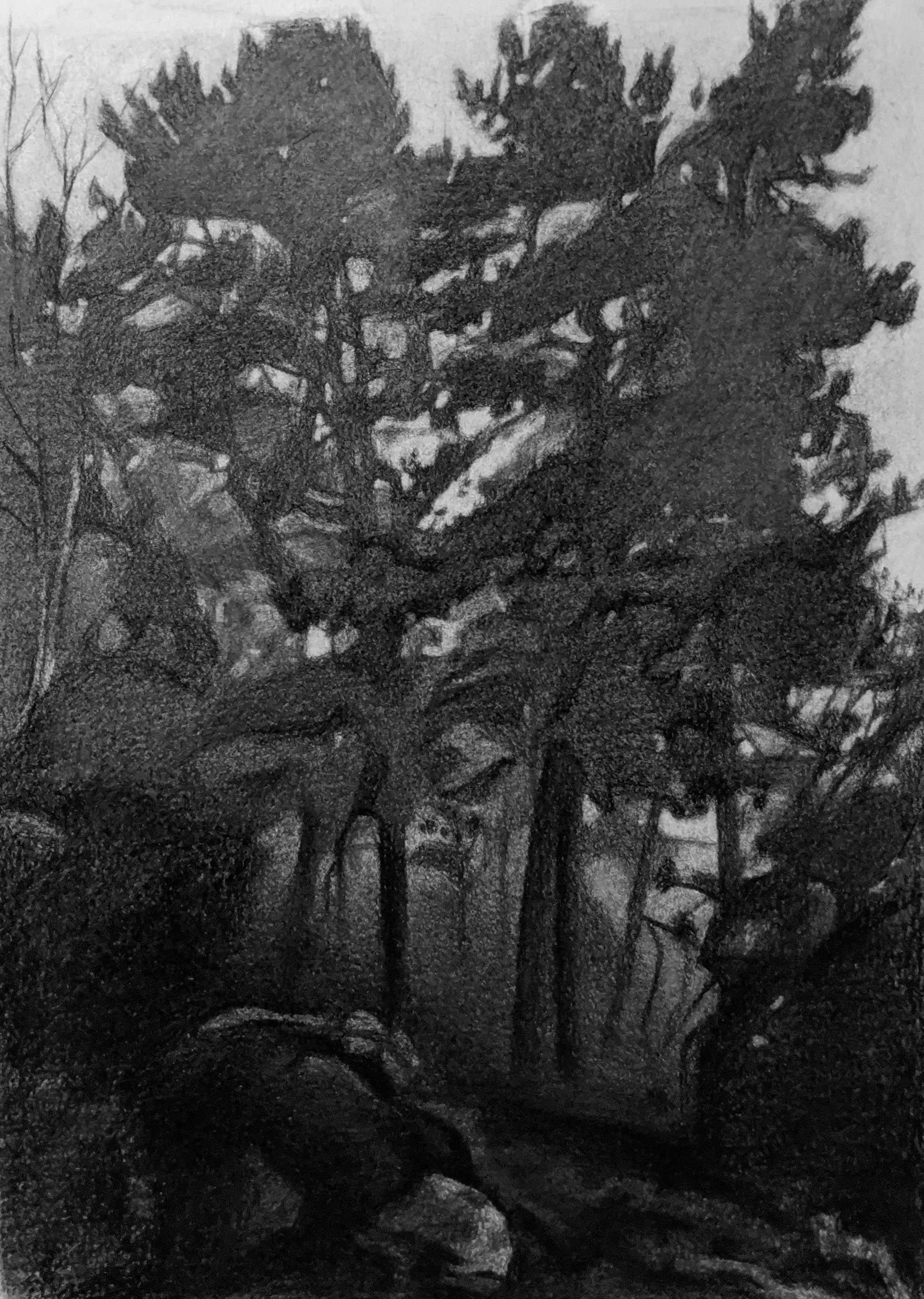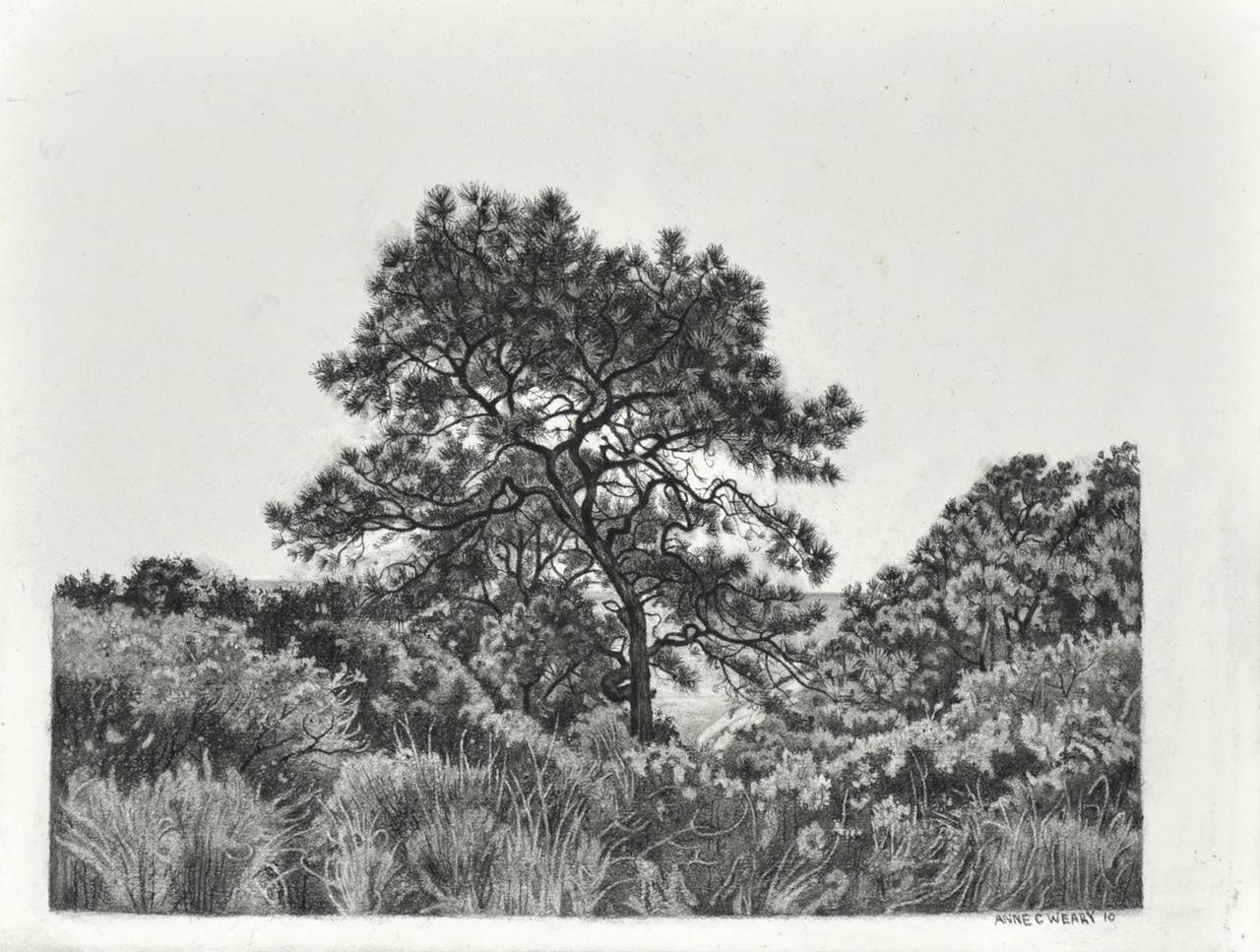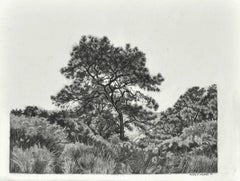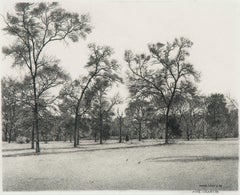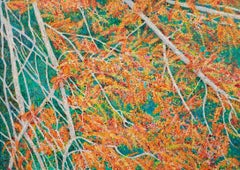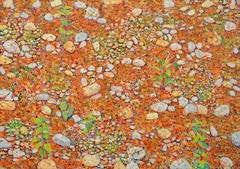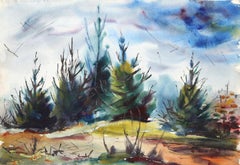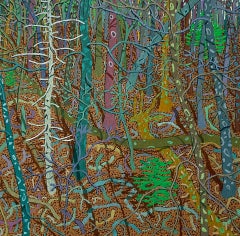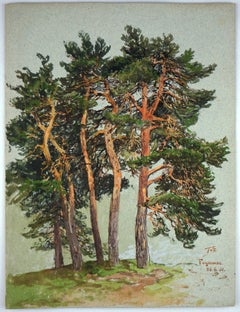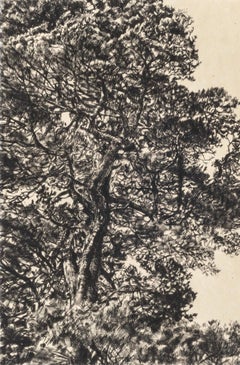Items Similar to Pines in Ravine
Want more images or videos?
Request additional images or videos from the seller
1 of 5
Anne C. WearyPines in Ravine2009
2009
$2,600
£1,973.88
€2,257.69
CA$3,632.58
A$4,040.22
CHF 2,109.68
MX$49,165.16
NOK 26,943.79
SEK 25,268.52
DKK 16,850.03
Shipping
Retrieving quote...The 1stDibs Promise:
Authenticity Guarantee,
Money-Back Guarantee,
24-Hour Cancellation
About the Item
“Anne Weary, who grew up as a Texas cowgirl, is at home in the outdoors and knows its ways and its language. There is a sort of very quiet but very powerful mysticism in her work, a sense of presence that goes quite beyond words,” wrote poet and University of Texas at Dallas professor Frederick Turner in the American Arts Quarterly.
Dallas born Weary studied under Olin Travis, Octavio Medellin and Chapman Kelley before earning a 4 year certificate from the Pennsylvania Academy of Fine Arts with awards for excellence in drawing. In 2008, Weary left Texas for a three year sabbatical in Southern California where she began drawing in Torrey Pines State Natural Reserve with red conté, a departure from the black charcoal and graphite of her meticulous drawings of Texas creekbeds and favorite trees.
This was drawn with sanguine conté crayon on paper.
The dimensions including the frame are 23 3/4 x 25 1/4 inches.
- Creator:Anne C. Weary (1952, American)
- Creation Year:2009
- Dimensions:Height: 14 in (35.56 cm)Width: 18.5 in (46.99 cm)
- Medium:
- Movement & Style:
- Period:
- Condition:
- Gallery Location:Dallas, TX
- Reference Number:Seller: 158631stDibs: LU257292942
About the Seller
5.0
Recognized Seller
These prestigious sellers are industry leaders and represent the highest echelon for item quality and design.
Established in 1954
1stDibs seller since 2013
161 sales on 1stDibs
Typical response time: Several days
Associations
Art Dealers Association of America
- ShippingRetrieving quote...Shipping from: Dallas, TX
- Return Policy
Authenticity Guarantee
In the unlikely event there’s an issue with an item’s authenticity, contact us within 1 year for a full refund. DetailsMoney-Back Guarantee
If your item is not as described, is damaged in transit, or does not arrive, contact us within 7 days for a full refund. Details24-Hour Cancellation
You have a 24-hour grace period in which to reconsider your purchase, with no questions asked.Vetted Professional Sellers
Our world-class sellers must adhere to strict standards for service and quality, maintaining the integrity of our listings.Price-Match Guarantee
If you find that a seller listed the same item for a lower price elsewhere, we’ll match it.Trusted Global Delivery
Our best-in-class carrier network provides specialized shipping options worldwide, including custom delivery.More From This Seller
View AllBent Tree, Torrey Pines
By Anne C. Weary
Located in Dallas, TX
“Anne Weary, who grew up as a Texas cowgirl, is at home in the outdoors and knows its ways and its language. There is a sort of very quiet but very powerful mysticism in her work, a sense of presence that goes quite beyond words,” writes poet and University of Texas at Dallas professor Frederick Turner in the American Arts Quarterly.
Dallas born Weary studied under Olin Travis, Octavio Medellin and Chapman Kelley before earning a 4 year certificate from the Pennsylvania Academy of Fine Arts with awards for excellence in drawing. In 2008, Weary left Texas for a three year sabbatical in Southern California where she began drawing in Torrey Pines...
Category
21st Century and Contemporary Contemporary Landscape Drawings and Waterc...
Materials
Conté, Paper
Early Spring - Cedar Elm
By Anne C. Weary
Located in Dallas, TX
“Anne Weary, who grew up as a Texas cowgirl, is at home in the outdoors and knows its ways and its language. There is a sort of very quiet but very powerful mysticism in her work, a sense of presence that goes quite beyond words,” writes poet and University of Texas at Dallas professor Frederick Turner in the American Arts Quarterly.
Dallas born Weary studied under Olin Travis, Octavio Medellin and Chapman Kelley...
Category
Late 20th Century Contemporary Landscape Drawings and Watercolors
Materials
Paper, Charcoal
Cypress Trees, October
By Jim Stoker
Located in Dallas, TX
Texas artist Jim Stoker began developing his confetti-splatter technique of painting in 2000 to depict his interpretations of the unique flora along the Guadalupe River, as well as t...
Category
2010s Contemporary Landscape Paintings
Materials
Linen, Oil
Chert and Limestone, Guadalupe River Bottom, Cypress Needles in October
By Jim Stoker
Located in Dallas, TX
Jim Stoker describes himself as an Artist-Naturalist, endeavoring to express his reverence for wildlife through his richly-colored paintings. In his love for the vivid and varied col...
Category
21st Century and Contemporary Contemporary Landscape Paintings
Materials
Linen, Oil
Pot Creek, NM, Summer
By Jane K. Starks
Located in Dallas, TX
The paper size is 30 1/8 x 44 inches
Category
21st Century and Contemporary Contemporary Landscape Drawings and Waterc...
Materials
Gouache, Paper
Untitled (Tree)
By Fred Nagler
Located in Dallas, TX
Fred Nagler was born in 1891 in Springfield, Massachusetts, where he first studied wood carving. From 1914 to 1917, he studied at The Art Students League of New York, where his prof...
Category
20th Century American Modern Landscape Drawings and Watercolors
Materials
Graphite, Paper, Watercolor
You May Also Like
Pines, Impressionist Watercolor by Eve Nethercott
By Eve Nethercott
Located in Long Island City, NY
Eve Nethercott, American (1925 - 2015) - Pines (P5.33), Year: 1958, Medium: Watercolor on Paper, Size: 15 x 21.5 in. (38.1 x 54.61 cm), Description: Scattered over the rollin...
Category
1950s Impressionist Landscape Drawings and Watercolors
Materials
Watercolor
Old Pine March, May, Wyatt Mt., Forest Landscape, Brown Woods Botanical
By Gregory Hennen
Located in Kent, CT
Rich, warm earth-toned brown trees line the forest floor in March in this rich, highly detailed landscape. The many shades of brown are offset by shades of luminous verdant green and...
Category
2010s Contemporary Landscape Paintings
Materials
Paper, Gouache
Norwegian Pine Grove - The inner glow of the trees -
Located in Berlin, DE
Themistokles von Eckenbrecher (1842 Athens - 1921 Goslar), Norwegian pine grove, 1901. Watercolor on blue-green paper, 30 x 22 cm. Signed, dated and inscribed in his own hand "TvE. Fagermes [i.e. Fagermes]. 26.6.[19]01."
- Slight crease throughout at left margin, otherwise in good condition.
About the artwork
Themistokles von Eckenbrecher often traveled to Norway to study the nature that fascinated him there. On June 26, 1901, near the southern Norwegian town of Fagernes, in the summer evening sun, he saw a small pine grove, which he immediately captured in a watercolor. He exposed the trees growing on a small hill in front of the background, so that the pines completely define the picture and combine to form a tense motif. The tension comes from the contrast of form and color. The trunks, growing upward, form a vertical structure that is horizontally penetrated by the spreading branches and the pine needles, which are rendered as a plane. This structural tension is further intensified by the color contrast between the brown-reddish iridescent trunks and branches and the green-toned needlework.
Themistokles von Eckenbrecher, however, does not use the observed natural scene as an inspiring model for a dance of color and form that detaches itself from the motif and thus treads the path of abstracting modernism. Its inner vitality is to be brought to light and made aesthetically accessible through the work of art.
It is precisely in order to depict the inner vitality of nature that von Eckenbrecher chooses the technique of watercolor, in which the individual details, such as the needles, are not meticulously worked out, but rather a flowing movement is created that unites the contrasts. The trees seem to have formed the twisted trunks out of their own inner strength as they grew, creatingthose tense lineations that the artist has put into the picture. The inner strength continues in the branches and twigs, culminating in the upward growth of the needles. At the same time, the trunks, illuminated by the setting sun, seem to glow from within, adding an almost dramatic dimension to the growing movement.
Through the artwork, nature itself is revealed as art. In order to make nature visible as art in the work, von Eckenbrecher exposes the group of trees so that they are bounded from the outside by an all-encompassing contour line and merge into an areal unity that enters into a figure-ground relationship with the blue-greenish watercolor paper. The figure-ground relationship emphasizes the ornamental quality of the natural work of art, which further enforces the artwork character of the group of trees.
With the presentation of Themistokles von Eckenbrecher's artistic idea and its realization, it has become clear that the present watercolor is not a study of nature in the sense of a visual note by the artist, which might then be integrated into a larger work context, but a completely independent work of art. This is why von Eckenbrecher signed the watercolor. In addition, it is marked with a place and a date, which confirms that this work of nature presented itself to him in exactly this way at this place at this time. At the same time, the date and place make it clear that the natural work of art has been transferred into the sphere of art and thus removed from the time of the place of nature.
About the artist
Themistocles' parents instilled a life of travel in their son, who is said to have spoken eleven languages. His father, who was interested in ancient and oriental culture, was a doctor and had married Francesca Magdalena Danelon, an Italian, daughter of the British consul in Trieste. During a stay in Athens - Gustav von Eckenbrecher was a friend of Heinrich von Schliemann and is said to have given him crucial clues as to the location of Troy - Themistokles saw the light of day in 1842.
After an interlude in Berlin, where Themistokles was educated at the English-American School, the journey began again. From 1850 to 1857 the family lived in Constantinople, after which the father opened a practice in Potsdam, where Themistokles, who wanted to become a painter, was taught by the court painter Carl Gustav Wegener.
In 1861 the von Eckenbrechers left Potsdam and settled in Düsseldorf. There Themistokles received two years of private tuition from Oswald Aschenbach, who greatly admired the talented young artist. After his artistic training, he undertook extensive travels, often accompanied by Prince Peter zu Sayn-Wittgenstein, which took him to northern and eastern Europe, but above all to the Middle East and even to South America. The paintings that resulted from these journeys established his artistic reputation and led to his participation in large panoramas such as the 118 x 15 metre Entry of the Mecca Caravan into Cairo, painted for the City of Hamburg in 1882.
1882 was also the start of a total of 21 study trips to Scandinavia, most of them to Norway, and the unique Norwegian landscape with its rugged fjords became a central motif in his work. Along with Anders Askevold and Adelsteen Normann...
Category
Early 1900s Naturalistic Landscape Drawings and Watercolors
Materials
Watercolor
$1,150 Sale Price
20% Off
Autumn Pine, Limited edition print, Landscape, Tree, Nature art
By Fiona Hamilton
Located in Deddington, GB
This print of a pine tree uses kitakata Japanese tissue chine collé to depict the warmth and colour of early autumnal light. It is then backed onto Hahnemule printmaking paper. The subject matter is from Ashton Court Estate in Bristol. This body of work is based on the book by Suzanne Simard, 'Finding the Mother Tree'. Trees communicate via mycorrhizal fungi to trade water and other nutrients. Ancient and mature trees nurture their offspring via these networks, as well as trading nutrients between other species. Botanist Simard has spent years working on this theory as part of a wider body of work, discovering what it means for forests, the climate and the wider Anthropocene. My work explores the ecological sublime and an appreciation of the majesty of nature. I use detailed intaglio etching, drypoint, lithography and chine collé to draw the viewer into an ethereal landscape that has an impact on our sense of place in relation to the natural world. I use primarily black and white with natural tones of chine collé and sometimes layers of lithographic texture to introduce warmth to the stark palette and to invoke a sublime emotional connection. I work from sketches, photographs, notes and memory to create my prints.
ADDITIONAL INFORMATION:
Black & White, Chine Collé, Drypoint, Drypoint print, Etching, Etching print on Paper
Edition of 20
44 H x 32 W x 1 D cm (17.32 x 12.60 x 0.39 in)
Sold unframed
Image size:
Height: 30cm (11.81 in)
Width: 20cm (7.87 in)
Complete size of sheet
Height: 44cm (17.32 in)
Width: 32cm (12.60 in)
Depth: 1cm (0.39 in)
ARTIST BIOGRAPHY:
Fiona Hamilton is a printmaker based in Bristol. Interested in process she uses a combination of mediums, both traditional and contemporary, to produce unique imagery, often as one off pieces or in small limited editions. She currently works in silkscreen, cyanotype and foil.
Fiona’s artwork draws on a lot of natural themes such as plants, leaves, trees and creatures including lots of birds. She mostly works directly from nature or from photographs she has taken. She regularly lugs a heavy telephoto lens about to get photos of birds...
Category
2010s Contemporary Landscape Prints
Materials
Drypoint, Etching
Ilkley Moor Pines
Located in Columbia, MO
Charcoal on paper
9 x 12 inches
Category
21st Century and Contemporary Still-life Drawings and Watercolors
Materials
Charcoal
Above all- pines. Watercolor, tempera on paper, Landscape, Classic, Polish art
By Włodzimierz Karczmarzyk
Located in Warsaw, PL
Contemporary watercolor and tempera painting on paper by Polish artist Wlodzimierz Karczmarzyk. The title is 'Above all- pines'. Main colour is green. Artwork's style is sketch-like ...
Category
Early 2000s Other Art Style Landscape Drawings and Watercolors
Materials
Paper, Watercolor, Tempera
More Ways To Browse
Cowgirl Painting
Boston Art
Death Painting
Oil Paintings 19th Century
Vintage Poster Prints
Mid Century American Artists
American Scene Paintings
Fewer Finer
Painting Of Children
Vintage Gelatin Prints
Surrealist Vintage
Abstract Painting On Wood
Advertising Art
Antique Oil Signs
Vintage California Art
Artist Cast
Drawing Of A House
Oil Painting Of Family
